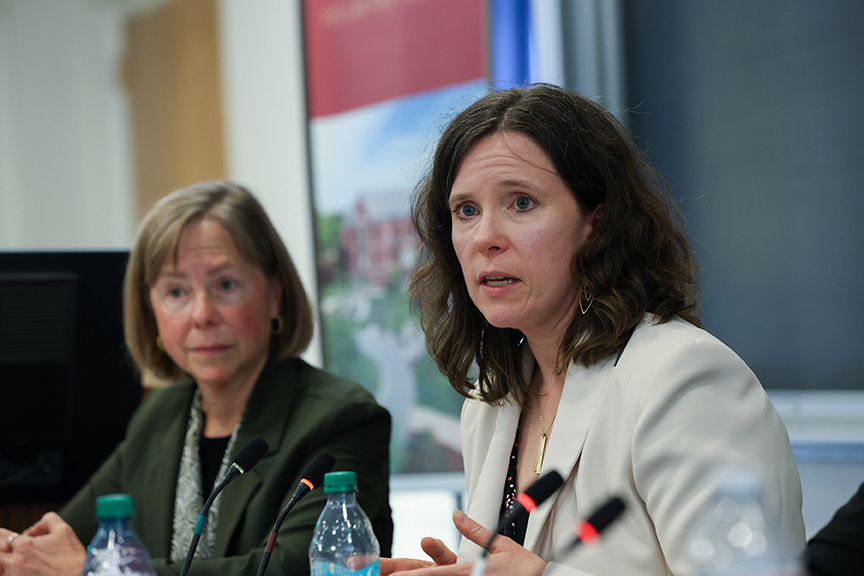The market for health insurance in Massachusetts is complicated, and with the new requirements presented by One Big Beautiful Bill Act, it’s on track to continue that way. Health care policy experts convened for the Rappaport Center for Law and Public Policy’s Nov. 12 panel, “Beyond the Shutdown Headlines: Issues and Impact on Massachusetts Health Care,” to discuss how the expiration of the Affordable Care Act advanced premium tax credits, coupled with new eligibility requirements posed by the One Big Beautiful Bill Act (OBBBA) will affect the future Massachusetts health care.
“It’s going to be devastating,” said Mary Ann Chirba, professor and John C. Ford, SJ, Distinguished Scholar at BC Law. She warns that both insurers and the insured will face higher costs as many consumers—especially younger, healthier people—opt out of the insurance pool. For many individuals, preventive care will be harder to access and hospitals may be treated as primary care centers for those who have fallen off of an insurance plan. In spite of this “bleak picture,” Chirba hopes that the culture of support in Massachusetts will provide a safety net for those hit hardest.
Chirba is not alone in forecasting how federal health policy will impact the state’s “culture of coverage.” Marissa Woltmann, chief of policy at the Massachusetts Health Connector, has been reflecting on the state’s culture with key stakeholders. Woltmann anticipates that 300,000 consumers will experience increased costs to their health insurance plans. The average individual will incur a $1,300 loss due to the expiration of the tax credits, leaving many to become uninsured.
Compounding the impact of the expiration of the advanced premium tax credits is the implementation of other provisions of the OBBBA in January. Woltmann warned, for example, that the OBBBA eliminates eligibility for premium tax credits for certain groups of individuals, including those who are lawfully-present immigrants whose incomes are under the federal poverty line.
An estimated 300,000 people will lose coverage as a result of the new eligibility requirements set out by OBBBA, according to Celia Segel, chief of staff at MassHealth. To combat these new provisions, MassHealth’s Health Safety Net, a key fixture of Massachusetts’ culture of coverage, will “pay safety net providers for providing uncompensated care to people who are uninsured or underinsured,” she explained.
The administrative cost will be high, as elucidated by panelist Mary Beckman, former senior advisor to the Executive Office of Health and Human Services of Massachusetts. “[W]hen people have to re-attest to their work status,” she said, “the administrivia necessary to keep up with that ends up being impossible, and so even if people are eligible, they end up falling out of the system.”
As MassHealth anticipates a $3.5 billion cut in federal health care funding, experts are reckoning with whether the preexisting safety net will be enough to fill the gap.
The expiration of advanced premium tax credits and the new OBBBA provisions is requiring practitioners to reckon not only with the cost of insurance premiums but the cost of health care itself. To address the economic cost, innovative thinking—while very nascent—is starting to occur between the Health Connector and its stakeholders, according to Woltmann.
The state’s culture of coverage—cultivated through the work of MassHealth and the Health Connector—may provide the safety net individuals need to remain covered amidst cutbacks.
Photograph by Reba Saldanha


